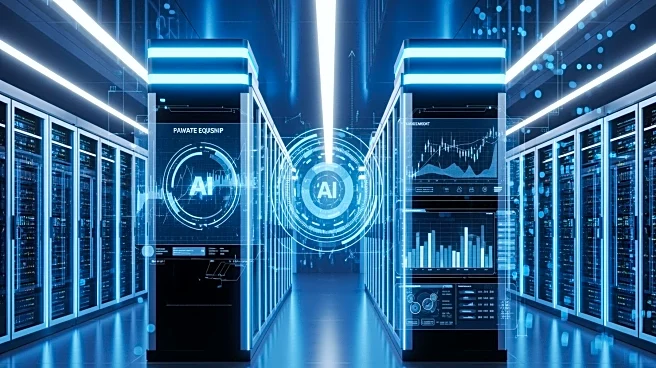What's Happening?
Tech companies are increasingly partnering with private equity firms to finance the construction of data centers, as the demand for AI technology continues to grow. These partnerships allow tech firms to avoid
taking on direct debt, which could negatively impact their balance sheets and shareholder returns. Instead, private equity firms raise the necessary funds, which tech companies repay through rent. This financial engineering involves repackaging data-center leases into bonds, which can be bought and sold. Meta, for example, has partnered with Blue Owl Capital to finance a data center in Louisiana. The AI industry is experiencing rapid growth, with global spending projected to reach $375 billion by the end of the year. However, concerns are rising about the sustainability of this growth, as data-center spending may soon outpace cash flows, potentially reducing liquidity for major tech firms.
Why It's Important?
The expansion of data centers is crucial for supporting the AI industry's growth, which is significantly contributing to the U.S. economy. However, the financial strategies employed to fund these expansions raise concerns about potential risks similar to those seen in past economic bubbles. The reliance on complex financial instruments and the rapid pace of investment could lead to instability if the expected returns do not materialize. This situation could impact investors, tech companies, and the broader economy, especially if a downturn occurs. The AI industry's influence on GDP growth highlights its importance, but also the potential vulnerability of the economy to shifts in tech sector performance.
What's Next?
As the AI arms race continues, tech companies may increasingly seek outside funding to maintain their competitive edge. This could lead to more partnerships with private equity firms and innovative financing methods. However, if the AI industry's growth does not meet expectations, there could be significant financial repercussions. Stakeholders, including investors and policymakers, will need to monitor these developments closely to mitigate potential risks. The sustainability of data-center investments and their impact on the economy will be key areas of focus.
Beyond the Headlines
The ethical and environmental implications of rapid data-center expansion are significant. The energy consumption required to power these centers is immense, raising concerns about environmental sustainability. Additionally, the financial engineering involved in funding these projects echoes past practices that led to economic crises, highlighting the need for careful oversight and regulation. The long-term impact on employment and economic stability will depend on how the industry navigates these challenges.











